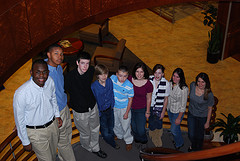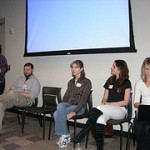
The second session i attended at Science Online ’09 was a fantastic discussion of how social networking sites, blogs and other online tools and media are used in high school biology instruction. What was so great about this discussion was that the panel was composed of high school science teacher Stacy Baker and several of her students (photo on left). The students intelligence, professionalism and enthusiasm were captivating. I was stunned at how into science they were how open about they were about their experiences. Each student stood up and brought to the audience’s attention a topic of interest related to online technology. This promoted discussion of the topic among the audience and between the class and the audience. The students (mostly freshman if I recall correctly) held their own and participated fully in the session. They brought to my attention several services I had not known about such as ning, where an online community can be created for a classroom that can essentially lock out nonmembers. Several other technologies such as blogs, wikis, twitter, etc. were also discussed for use in the classroom.
Beyond the technological aspects though were the more meta-issues. I was introduced by one student to the “creepy treehouse” phenomenon. From the session notes posted on the Science Online wiki:
“Anytime other people not related to the class or subject being discussed are involved it becomes uncomfortable. The students do not want close personal relationships with their teachers. Just like it’s awkward to see a teacher outside of the school environment, it is awkward to see a teacher in an online environment that is not necessarily school related.”
Yeah, I must say that would be awkward! But it was different in college. Perhaps in part to maturity by that time, but I often never shied away from a professor when I saw him or her outside of the classroom. One teacher mentioned it was a way she could keep tabs on students after they graduated. The consensus seemed to be to add a person to Facebook or other service after graduation.
Another important discussion of this session had to do with, as Jason Robertshaw always says, managing your public information. The web exists and combinations of our the letters that make up our names exist on the web and are searchable. Students have a more difficult time understanding the connectiveness of the internet and do not realize the permanence of what you post to it. It is important to not post things that you may regret in 5 years from now. Employers google applicant’s names, as might college administrators and potential graduate/professional school advisors. What a tangled web we weave…






Thanks for writing this up – I wasn’t able to make it to this session and based on what everyone is saying it was a corker!
Funny. I found this page again after searching the Google News Archive for my name. Feel kind of recursive. Also, Google considers your site a news archive, not just a blog archive. Neat.